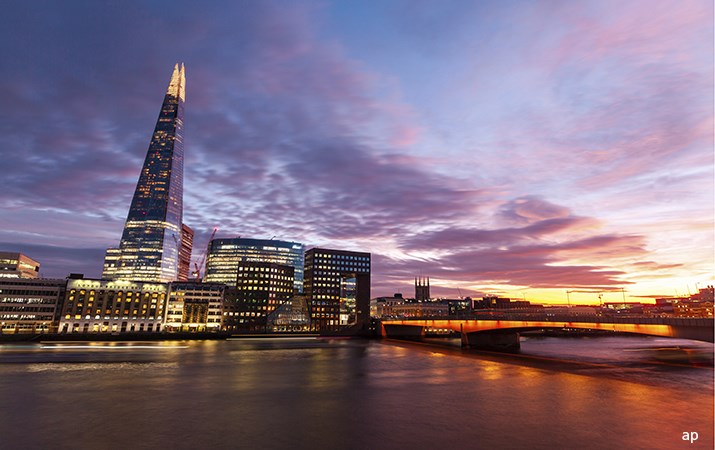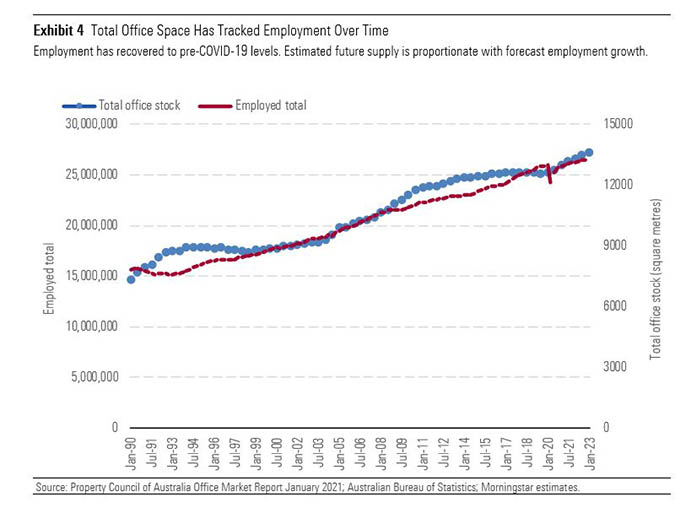
Many British workers are preparing to return to the office in the next few months, in some cases for the first time in over a year. Some are reluctant returners, having enjoyed aspects of flexible working, but others are keen to see colleagues and contacts again. Whatever this year may bring, the UK vaccine rollout and re-opening of parts of the UK economy should ease the path back to “normality”, and that means more people going back to their old desks.
5 Key Lessons from Australia’s Re-Opening
With negligible coronavirus cases, Australia is one of the first countries to embrace the return to the office. Morningstar equity analyst Alexander Prineas has published a report on the Australian office sector and its conclusions could have some parallels for commercial property markets in the UK and beyond.
1. Workers May Get More Space
Even if vaccination programmes continue and cases fall, social distancing measures mean that employees will need greater distance between each other. This may mean that employers will still need similar sized offices as before the pandemic, Prineas says. There may not be as many people in the building, but the space taken up will remain the same if there are larger gaps between desks.
2. Flexible Working Still Won't Be the Norm
Companies may have already started to shrink their square footage before the pandemic, Prineas notes, particularly as fewer people in the workforce hold down full-time roles anyway (this rise in part-time working, including the growth of the “gig economy”, has been a trend in the UK too since the financial crisis). He believes that concerns over a dramatic drop in office demand is overblown, particularly in the biggest cities.
3. Offices Might Get Nicer
For every employee desperate to chat around the water cooler again, there’s another who is less keen to bring the stress of commuting back into their lives. How do you entice the reluctant returners back? Prineas says the onus is on the company to make the office space more attractive: “If work-from-home adoption endures, employers will want to attract employees via functional and appealing workplaces.” A recent survey by Deutsche Bank asked financial services workers what they enjoyed most about working from home: while 68% said not having to commute, and only 2% said their IT/internet set-up was a benefit of WFH.This suggests that quicker broadband and closer access to IT support may be a factor in luring people back into cities.

4. Supply and Demand Will Balance Out
In Australia at least, there isn’t going to be a big oversupply of empty offices as in previous economic downturns, such as in the 1990s and in the wake of the 2008-2009 financial crisis. Demand for office space is likely to rebound quickly as the economy improves. “Many of these businesses plan to reassess office requirements in future, with the expectation of a return to an office once the pandemic abates,” Prineas says. (The link between office space and employment has been very close over the last 30 years.)
5. Companies Are in Wait-and-See Mode
While the path out of lockdown may be getting clearer in the UK, the risk of new coronavirus variants means that employers are probably deferring drastic decisions – such as closing the main office entirely and allowing the entire workforce to WFH permanently. “We think it more likely that employers seeking to cut space will do so gradually, by making small reductions to space over time, or by delaying office expansions,” Prineas says. This means that companies will hold back in signing long-term leases until there’s more clarity, he adds.
Where Does That Leave the UK?
Laura Elkin, manager of AEW UK REIT (AEWU), says that offices in prime locations with decent amenities should fare better than those in out-of-town locations – and be more attractive to prospective employees too. She says that the social side of company life is still a big draw for employees, with opportunities for networking that virtual working can’t replicate. “A lot of industries rely on seeing people face to face and … that was always be an element Zoom will not cater for,” she adds.
M&G Property, one of Britain’s largest open-ended property funds, is set to re-open in May, having gated in December 2019 before the pandemic. Most funds in the sector have now lifted restrictions on investors selling their units as the path to lockdown easing became clearer in early 2021. Some have taken the option of selling out now they can, according to Morningstar’s latest fund flows data, with the sector seeing outflows so far this year. Still, prospects for office life are much better than a year ago at the height of the pandemic and with Brexit uncertainty still a factor weighing on investor sentiment. While most UK property funds posted negative returns in 2020, most are in the black so far in 2021, according to Morningstar Direct data - and L&G UK Property, the largest in the sector with over £2 billion in assets, is up 3.5% so far this year.



























